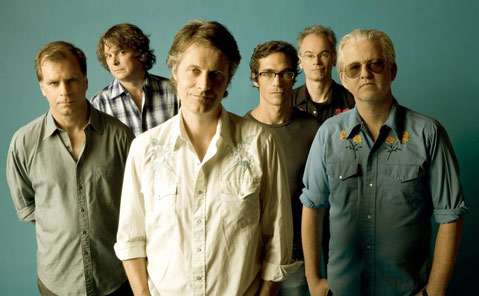Blue Rodeo to Co-Headline Sings Like Hell
Canadian Roots Rockers Head to the Lobero this Saturday

Santa Barbara currently is in the grip of a Canadian invasion. With Po’ Girl and Fred Eaglesmith having already sauntered across the Sings Like Hell stage this season (and a visit from Oh Susanna still pending), this weekend marks the arrival of one of Canada’s biggest musical names-Blue Rodeo. Built around the musical partnership of Jim Cuddy and Greg Keelor, the band formed in Toronto in 1984 and across the ensuing years have released 11 albums, collected seven Juno Awards, and worked with everyone from Sarah McLachlan to Kathleen Edwards. While their contemporary take on roots music has thrust them to the forefront of the Canadian music scene, it has also hindered their success here in the U.S. Not that they are complaining. Brett Leigh Dicks recently spoke with Jim Cuddy about the band’s contrasting fortunes, Canada’s love of original music, and what it’s like to be as sexy as Leonard Cohen.
The band is built around the songwriting of yourself and Greg Keelor. How has that relationship evolved throughout the years? It’s been everything. Greg and I go back to basically me being in university and him learning how to play guitar. In the early days, we lived and worked and played music together. We were always around each other and would be helping each other out with ideas, and then, as we got our own homes and lives, we started to write songs separately and bring them to each other, and then directly to the band. The last record was a real band record, but with this next record, Greg and I are going to meet in the studio and write and flesh out things together before we take them to the band.
You both have very active solo careers. Has that made it necessary for you to adopt a more collaborative approach? Not really. I think what that has done is taken the pressure off us as individuals relying upon one entity. [Our careers] have become very relaxing and recreational sidelines-that’s the way I look at my solo band. I love it. It’s fun. I love the people I play with. I can do all sorts of things that Blue Rodeo wouldn’t do. But I think what truly fuelled this idea of coming back and working together was the last record was a complete band record. The band had a lot to do with every arrangement and every decision, and we like to work in contrast to our last record.
Blue Rodeo was one of the initial bands that embraced contemporary roots music in the ’80s. What drew you to the genre? We were spectacularly lucky. We had been in New York from ’81 to ’84, and in those days, we did ska tunes, reggae tunes, pop tunes, we even had New Wave tunes. For us it was a good learning experience, but at the end of it, we had no idea what sort of band we were. We decided to pursue something a little more rootsy. We had seen a little evidence of that in New York, but when we came back to Toronto, there was a full-blown roots scene. And there was a huge audience there. Canada finally had its own domestic scene and there was no saturation point. We came back and found ourselves right in the middle of that, doing exactly the right thing.
You alluded to the support of your Canadian audiences. They seem to be very musically open-minded. I think I can say this safely that there’s a much broader acceptance of all genres of music up here than there is in the United States. Greg and I have always been a two-headed monster in this band. Every concert is going to be very different, and sometimes the records are going to be radically different also. We have never ever experienced any resistance to that up here. In fact, our band is so much more popular than our solo acts. Canadians like the contrast and are not hung up on authenticity. It doesn’t have to be like real roots music; they don’t mind bastardization or jazz thrown in. I think the telling feature is, if you go and see a band, does the audience turn up for the opening act? And I think 75 percent of the time up here they do. They want to come and see something new.
Why don’t you think that success has translated in the States? That’s the unanswerable question. There are two Canadian questions that are unanswerable: Why do people up here like you? And why is it that Americans don’t? Part of the learning experience is that authenticity is a lot more important down there. I don’t think the characters we are resonate in the same way that Jeff Tweedy resonates with people down there. We are this duo that has contrasting pieces, and I don’t know if that is automatically understood. We have had every opportunity in the States-we tour, we have been on all the talk shows, we have been reviewed everywhere-people have had the chance to check us out. So I just really don’t know.
I saw you were recently nominated alongside Leonard Cohen as one of the sexiest Canadian musicians. What’s it like to be keeping such esteemed company? Ha! Leonard has my highest admiration. I have sort of peripherally known Leonard since our New York days and he was such a successful ladies’ man, my God. So that is high praise indeed.
4•1•1
Blue Rodeo will play the Lobero Theatre (33 E. Canon Perdido St.) with Tim Easton this Saturday, February 21, at 8 p.m. Call 963-0761 or visit singslikehell.com for ticket info.



